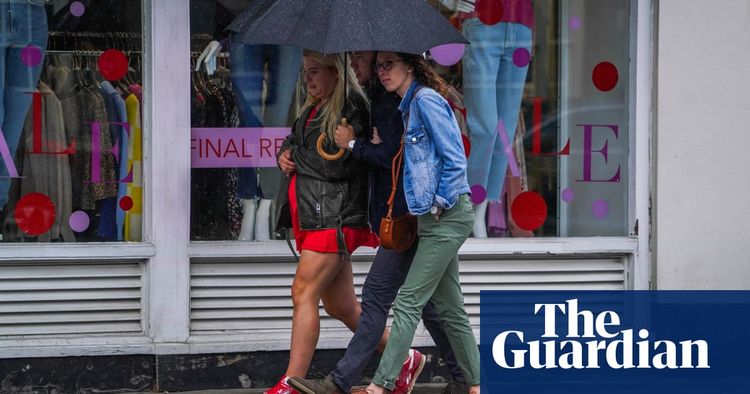UK shop prices in first monthly fall for two years amid big discounts

The largest retailers in the UK have recorded the initial decline in shop prices over the course of two years, as they made an effort to lure customers with significant markdowns amidst the unexpectedly damp weather in July.
According to the British Retail Consortium (BRC), the prices of items in shops decreased by 0.1% in July compared to June. Additionally, the BRC, in collaboration with NielsenIQ, recorded a decrease in the annual inflation rate of shop prices, which reached its lowest point this year at 7.6% in July, down from 8.4% in June.
Retailers significantly reduced the prices of clothing and footwear in an attempt to entice shoppers to invest in summer attire, despite the widespread rain and floods throughout the country during that period.
Last month, the increase in food prices decreased to the lowest level of 2023. The expense of essential items such as oils, fats, fish, and breakfast cereals reduced, providing some relief to financially struggling individuals.
The amount by which food product prices increase each year dropped for the third straight month in July, but remains high at 13.4%. This is lower than the 14.6% increase seen in June and is the lowest it has been since December of the previous year.
Although the price of goods in shops during July might seem positive, the BRC has warned that retailers may encounter another increase in the expenses of raw materials, especially for food, due to global circumstances.
Food prices worldwide have experienced an increase recently, specifically regarding wheat and corn, as a result of Russia's choice to end the agreement concerning grains from the Black Sea. This agreement had enabled Ukrainian cereals to be accessible in global markets.
The cost of rice has also increased following India's decision to prohibit the export of regular white rice in order to control the rise in prices within the country. This measure was taken due to the adverse impact of heavy rainfall on domestic crops.
Helen Dickinson, the British Retail Consortium's CEO, stated that retailers might encounter additional problems with the supply chain, which could lead to higher input costs in the upcoming months. Dickinson also mentioned that while the prices of various goods might reduce, the decline in food prices will happen at a slower pace.
Retail businesses are persistently striving to maintain the downward trend of prices. It is essential for the government to contribute as well by halting the increase in business rates starting in April of the upcoming year. If this is not done, there is a possibility of introducing an extra £400 million burden on prices.
In recent weeks, the retail sector, especially food retailers, has faced scrutiny due to the increasing cost of living. As a result, supermarket executives were questioned by members of parliament in late June and refuted allegations of boosting profits by keeping food prices high.
Nevertheless, there seems to be a deceleration in the overall increase in prices, as indicated by the UK's yearly inflation rate. This rate considers the fluctuations in the cost of goods and services throughout the economy. Surprisingly, the inflation rate dropped to 7.9% in June, mainly due to a significant decrease in petrol expenses.
The June data released by the Office for National Statistics revealed an unexpected drop in inflation, which is the first time this has happened since the beginning of the year. As a result, financial experts in the City have revised their predictions for how much the Bank of England will raise interest rates, both this week and in the upcoming year.
Mike Watkins, the leader of retailer and business insight at NielsenIQ, anticipates an increase in consumer spending that is not necessary due to the summer vacations and the positive expectations for inflation.
Nevertheless, he further expressed: "Consumers persist in altering their shopping habits as a means of dealing with the current circumstances. They are now frequenting various stores, purchasing more affordable products, postponing expenses, or solely making purchases during promotional events. This pattern of behavior seems likely to persist."









































